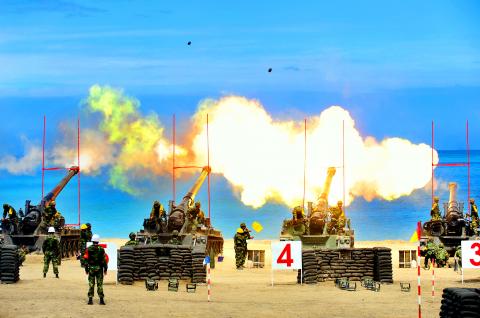The latest computerized scenario carried out by the military showed that in a war with China, Taiwan’s military was able to defeat enemy forces after they landed and tried to occupy the country, a local newspaper said yesterday.
The Chinese-language China Times reported that the Han Kuang 27 computerized war games held from July 18 to July 23 showed the military would survive a first strike from the People’s Liberation Army’s (PLA) from the air and sea. In the simulation, after PLA troops landed in the central part of the country, Taiwanese troops surrounded the enemy forces in the Dadu Mountain (大肚山) area near Greater Taichung and annihilated them.
This was the best performance in computerized war games carried out by the military in recent years, the newspaper said.

Photo: Chang Chung-yi, Taipei Times
Under the scenario, which assumed war next year, the PLA launched about 1,000 ballistic missiles and cruise missiles to attack Taiwan’s air force, civilian airports and various military facilities, before sending in ground troops from the sea and air, the newspaper said.
The scenario also had China’s Il-76 airlifters, which carry a number of paratroopers, taking off from airports in Fujian Province with air support from Su-30 aircraft.
Those paratroopers then carried out a successful occupation of Taiwan’s military airports.
Out at sea, a division of PLA landing craft groups would head toward Taiwan, with more than 100,000 soldiers crossing the Taiwan Strait in civilian vessels.
The report said the landing craft groups would pretend to be heading toward northern Taiwan and that the Sixth Army Corps stationed in northern Taiwan would prepare to ward off the enemy. However, the sea troops would suddenly change direction and land in the area near Taichung Harbor and the Dajia River (大甲溪).
PLA troops would occupy Taichung Harbor and Cingcyuangang Air Force Base in Greater Taichung, putting the Taiwanese military at a disadvantage.
However, after the army defeated the small forces landing on northern and southern Taiwan, the Eighth Army Corps succeeded in heading to the Dadu Mountain area and with the mobilization of reserve troops, the military surrounded enemy forces and defeated them.
The report said the key point to winning the war simulation is that after the PLA launched the missile strikes, Taiwan’s air force quickly moved its major fighters into tunnels at Hualien Air Force Base. With air support from fighters and helicopter forces, the army was able to defeat the enemy in the Greater Taichung area in the simulation.
Military spokesman David Lo (羅紹和) said the military would not comment on the news report.

Taiwan is to commence mass production of the Tien Kung (天弓, “Sky Bow”) III, IV and V missiles by the second quarter of this year if the legislature approves the government’s NT$1.25 trillion (US$39.78 billion) special defense budget, an official said yesterday. Commenting on condition of anonymity, a defense official with knowledge of the matter said that the advanced systems are expected to provide crucial capabilities against ballistic and cruise missiles for the proposed “T-Dome,” an advanced, multi-layered air defense network. The Tien Kung III is an air defense missile with a maximum interception altitude of 35km. The Tien Kung IV and V

The disruption of 941 flights in and out of Taiwan due to China’s large-scale military exercises was no accident, but rather the result of a “quasi-blockade” used to simulate creating the air and sea routes needed for an amphibious landing, a military expert said. The disruptions occurred on Tuesday and lasted about 10 hours as China conducted live-fire drills in the Taiwan Strait. The Civil Aviation Administration (CAA) said the exercises affected 857 international flights and 84 domestic flights, affecting more than 100,000 travelers. Su Tzu-yun (蘇紫雲), a research fellow at the government-sponsored Institute for National Defense and Security Research, said the air

A strong continental cold air mass is to bring pollutants to Taiwan from tomorrow, the Ministry of Environment said today, as it issued an “orange” air quality alert for most of the country. All of Taiwan except for Hualien and Taitung counties is to be under an “orange” air quality alert tomorrow, indicating air quality that is unhealthy for sensitive groups. In China, areas from Shandong to Shanghai have been enveloped in haze since Saturday, the ministry said in a news release. Yesterday, hourly concentrations of PM2.5 in these areas ranged from 65 to 160 micrograms per cubic meter (mg/m³), and pollutants were

Taiwan’s armed forces have established response protocols for a wide range of sudden contingencies, including the “Wan Chun Plan” to protect the head of state, the Ministry of Defense (MND) said today. After US President Donald Trump on Saturday launched a series of airstrikes in Venezuela and kidnapped Venezuelan President Nicolas Maduro, concerns have been raised as to whether China would launch a similar “decapitation strike” on Taiwan. The armed forces regularly coordinate with relevant agencies and practice drills to ensure preparedness for a wide range of scenarios, Vice Minister of National Defense Hsu Szu-chien (徐斯儉) told reporters before a